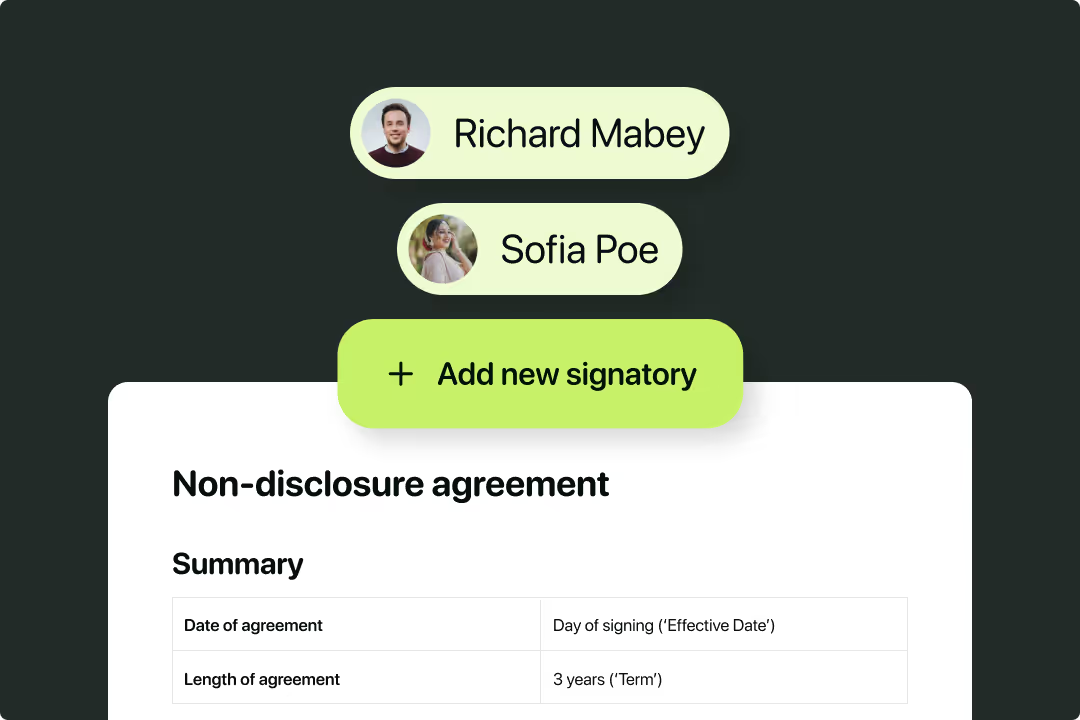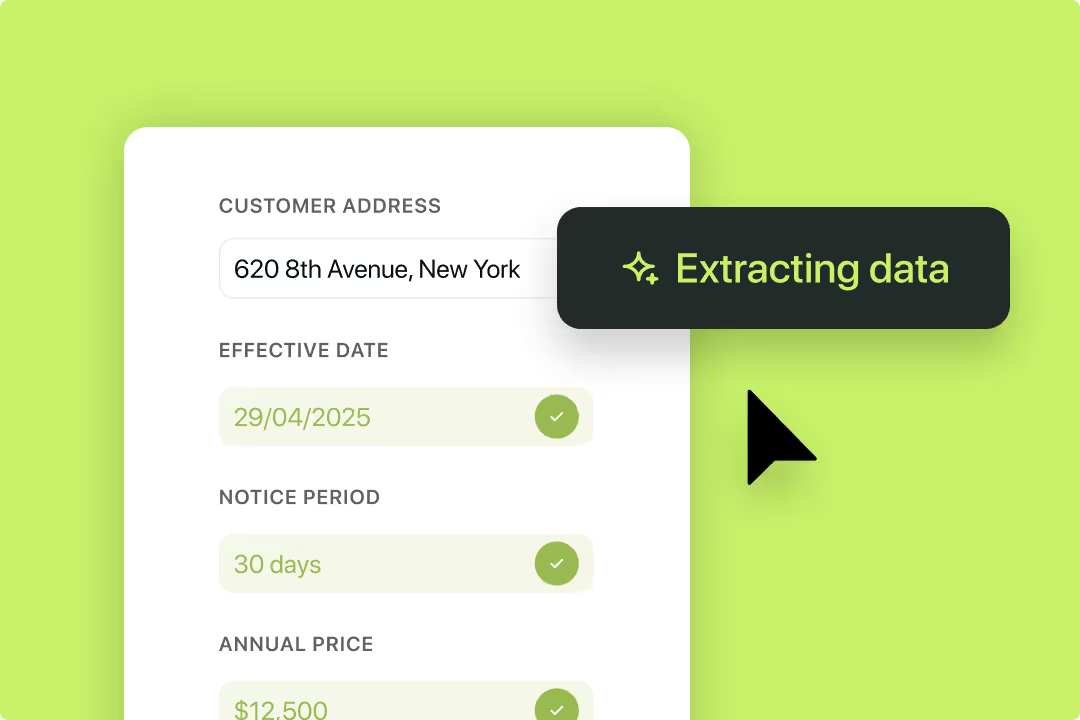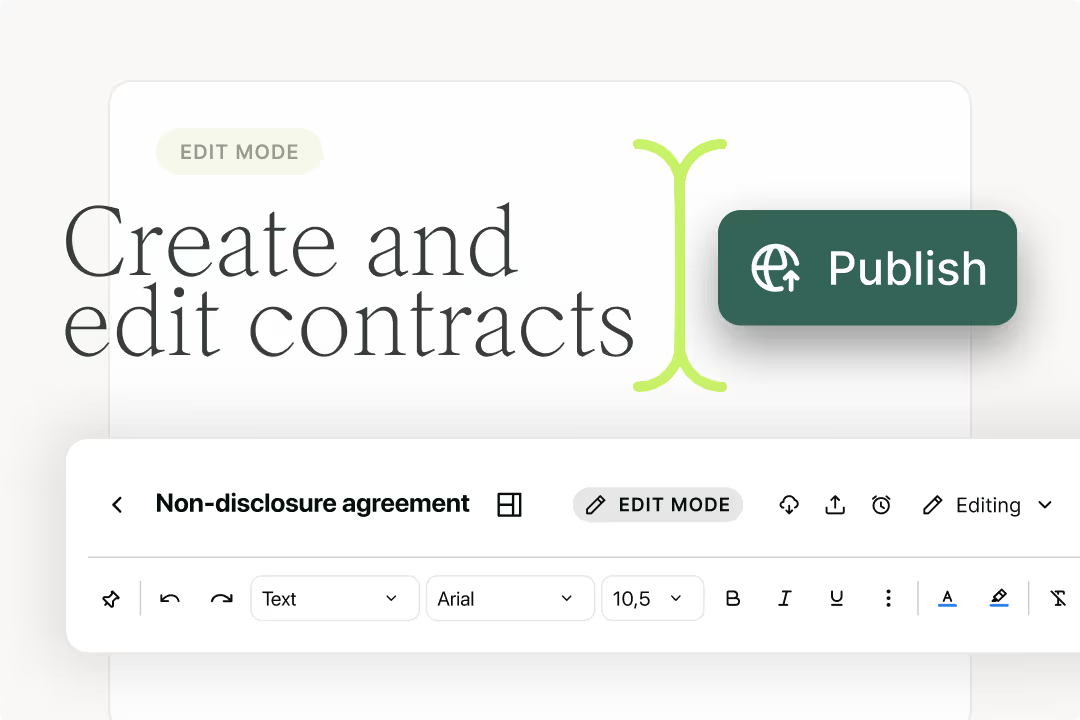Solutions
Customer Support
Resources
It’s important to know the effective date of a contract as this information details precisely when a contract comes into effect, and when the obligations within the contract need to begin to be fulfilled.
Without this information, parties to a contract could begin to perform the contract’s obligations late, or they could perform them too early, meaning that they’ve exceeded the initial expectations of the transaction.
Not only does this reduce the risk of conflicts relating to contract duration in terms of liability, but the clarity effective dates provide can create a more positive relationship between the contracting parties overall, which is one of the various purposes of a contract.
An effective date is a specific date when an agreement or transaction between one or more parties becomes legally binding and the terms outlined in the contract begin to apply.
The effective date marks the point from which parties need to begin to fulfill their obligations under the contract, and it can be a date in either the past, present, or future, depending on what the parties to the contract agree.
The effective date can usually be found in the subsection of a contract that outlines the duration of the relationship or contract, where the effective date is clearly described, as well as any exceptions that might affect this date, or lead to the early termination of the contract.
Here is an example of how effective dates are usually described in a contract:
This Agreement shall, commence on the date of this Agreement (the "Effective Date") and shall continue for the period specified in the order form (the "Initial Period") and, thereafter, this Agreement shall be automatically renewed for successive periods of the same length (each a "Renewal Period").
However, we’re strong advocates for making contracts more human here at Juro. We think it’s often also useful to also show the important contract details, like the effective date, at the forefront of a business contract, like this:

It’s important to know the effective date of a contract as this information describes precisely when a contract comes into effect, and when the obligations within the contract need to begin to be fulfilled.
Without this information, parties to a contract could begin to perform the contract’s obligations late, or they could perform them too early, meaning that they’ve exceeded the initial expectations of the transaction.
Not only does this reduce the risk of conflicts relating to contract duration in terms of liability, but the clarity effective dates provide can create a more positive relationship between the contracting parties overall, which is one of the various purposes of a contract.
We’ve heard why adding an effective date to your contract is important, but what are the specific advantages of doing so? Well, the benefits of contract effective dates include that they:
One of the biggest advantages of effective dates is that they provide clarity. By setting an effective date within a contract, parties can be certain of when they are expected to begin performing the contract terms, and when they are not.
This eliminates the risk of parties trying to make the counterparty accountable for any action or inaction prior to the contract coming into effect, as the start date is clearly outlined in the agreement.
If tracking your contracts and their performance is a key priority for your business, hit the button below to get in touch and find out more.

Effective dates are also advantageous as they enable legal and business teams to finalize future deals and capture revenue early on. This is because effective dates can be in the future, meaning that the contract doesn’t need to take effect as soon as it’s been signed.
Rather, organizations can formalize and sign contractual agreements ahead of time, and they can wait for them to come into effect.
Since effective dates enable contracts to be formalized ahead of time, they also help the business prepare better for future transactions.
For instance, if a vendor agreement or supplier agreement is signed in advance, this allows the seller to prepare their stock if they’re selling physical goods, or prepare onboarding for their services.

One of the most important advantages of putting an effective date in a contract is that it offers both parties legal security. For example, if one party is dissatisfied with the duration of a contract, they can rely on the effective date and termination date before the court, and vice versa.
Setting an effective date in a contract can also empower legal teams and those they enable to track and monitor the progress of different contracts since contract automation software like Juro allows users to sift through large volumes of contracts and filter or view them by the effective dates.
This can be achieved in a contract dashboard like the one below:

Using Juro’s all-in-one contract automation software, it’s simple to set, manage and track effective dates.
Juro enables legal and business teams to add effective dates to contracts at scale, but also to individual agreements.
One of the best ways to add an effective date to standard contracts in Juro is by using an automated template. When using an automated template, teams can enter key details such as the effective date, the counterparty name and the length of the agreement by changing the smartfields.

This allows commercial teams like sales, HR and finance to self-serve on contracts, as it ensures that the more technical clauses surrounding the contract duration can be replicated without the need for legal to re-draft them each and every time.
However, it also ensures that the contracts can be customized to communicate the more specific and personal details for each individual contract, like when it will take effect.
In a manual contract workflow, when parties want to amend or correct the effective date in a contract, they have to contact the contract author, make the change in a Word document, export it to PDF, or email it back and forth and wait for a response in their inbox.
By comparison, when parties change an effective date in Juro, they simply need to amend the date in the text editor and it will make the changes immediately to the live document, which will automatically notify the counterparty. This is key to achieving a more efficient contract workflow.

Without contract management software in place to efficiently manage and store your contracts, it can be near impossible to filter, find and track contracts’ effective dates and monitor performance.
In Juro, users can sort contracts based on different criteria and filter the dashboard to show the most relevant contracts or ones with specific smart field values. This means that Juro users can filter contracts based on their effective dates, as well as other values like renewal dates, value, and contract type.
Similarly, Juro users can set up a table view where they can see all of their effective dates in one place. This is called Juro's contract repository.
This makes it quicker and easier to search and query specific contracts to find out when they come into effect.
Juro is an all-in-one contract automation platform that helps visionary legal counsel and the teams they enable to agree and manage contracts in one unified workspace. If you’re ready to close contracts faster, book your personalized demo.
So long as the effective date has been agreed by all parties at the point of signing, the effective date can be a date that has already passed. However, this might vary depending on the type of business contract.
Usually, the effective date will be mutually agreed upon between both parties, but the contract author will usually be the person to fill in this date. However, just because a contract is on third-party paper, that doesn’t mean you can’t negotiate the effective date.
To make the process of setting effective dates for contracts easier, Juro users can create automated templates that use smartfields to generate details like effective dates, among other things. This eliminates the administrative work in-house legal and business teams need to do when implementing large volumes of contracts with the same effective date.
It is possible to change the effective date of a contract by amending the contract. However, to do so you would need to follow the usual processes involved in contract amendment. Find out more about how to amend a contract.
An execution date is a date upon which the parties involved in an agreement officially sign a contract and agree on the terms outlined. By comparison, the effective date is the date upon which parties will need to begin fulfilling their obligations under the contract, which doesn’t necessarily have to be immediately after a contract has been signed.
The effective date describes the date where the contract terms take effect and the execution date describes the date when the contract was originally signed.
There is no substantial difference between a commencement date and an effective date, as they both describe the date on which contract activities commence, or come into effect. It’s more common to see ‘effective date’ used within the context of business contracts, though.
Lorem ipsum dolor sit amet, consectetur adipiscing elit. Suspendisse varius enim in eros elementum tristique. Duis cursus, mi quis viverra ornare, eros dolor interdum nulla, ut commodo diam libero vitae erat. Aenean faucibus nibh et justo cursus id rutrum lorem imperdiet. Nunc ut sem vitae risus tristique posuere.

